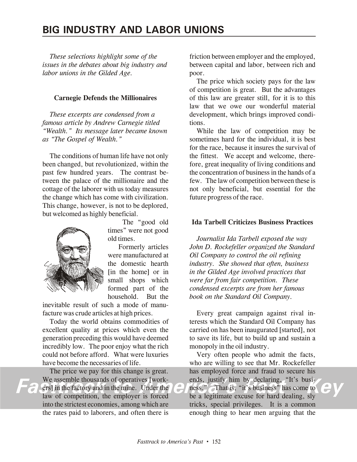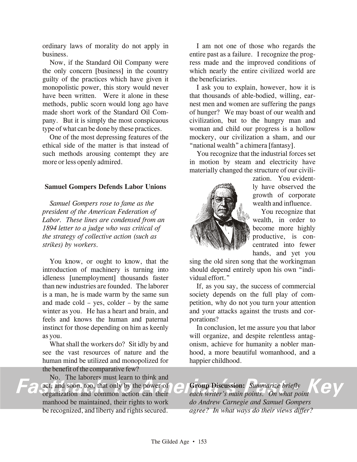| Fasttrack
to America's Past Teacher Key |
|
| Fasttrack
to America's Past Teacher Key |
|
 Page 152  Page 153 |
Pages 152
& 153 - Big Industry and Labor Unions The reading selection The three selections on these pages give a variety of viewpoints about the big industries that grew in the Gilded Age, and the challenges this presented to working people. The views come from: Andrew Carnegie, the Scottish immigrant who created a great fortune by improving the steel making industry. Ida Tarbell, a woman journalist who exposed crooked dealings in John D. Rockefeller's Standard Oil trust. Samuel Gompers, who formed the American Federation of Labor, a national labor unionThe pictures 1. Andrew Carnegie, who built up the American steel industry and grew fabulously wealthy in the process. After retiring from business, he gave most of his fortune away to projects that would help the public, such as building libraries in hundreds of American cities. 2. Samuel Gompers, who formed the American Federation of Labor to help working people win better pay and working conditions. He continued his work as a champion of the labor movement well into the early 1900s. Group discussion questions Andrew Carnegie makes the argument
that big industry has been good for both rich and poor Americans.
The poor
of the Gilded Age, he points out, enjoy many things that the rich of
previous times
could not afford. What seems to bother Tarbell as much as crooked dealing in business is the lack of concern about it shown by the public. Often, she says, crooked dealing is "more or less openly admired." Samuel Gompers makes a plea
for the workers of the Gilded Age factories. He agrees that the
changes
brought by big industry are beneficial in many ways, but he argues that
workers are often cast away without mercy or concern when they are not
needed in their workplace. He
points out that "to the hungry man and woman and child our progress is
a hollow mockery." Gompers, however, says that workers need to organize into strong labor unions to find protection from the disruptions created by growing industry. He describes how the introduction of more efficient machinery sometimes threw men and women out of work faster than new industries were started that could employ them. As a result of such changes, workers at times suffered badly during periods of unemployment. Carnegie does not appear overly concerned by such realities, but Gompers considers the situation deeply unfair. He wants progress, but also fair protection for workers that will ensure "a nobler manhood, a more beautiful womanhood, and a happier childhood."
|
|
Copyright Notice
Copyright 2018 by David Burns. All rights reserved. Illustrations and reading selections appearing in this work are taken from sources in the public domain and from private collections used by permission. Sources include: the Dover Pictorial Archive, the Library of Congress, The National Archives, The Hart Publishing Co., Corel Corporation and its licensors, Nova Development Corporation and its licensors, and others. Maps were created or adapted by the author using reference maps from the United States Geological Survey and Cartesia Software. Please see the home page for this title for more information. |